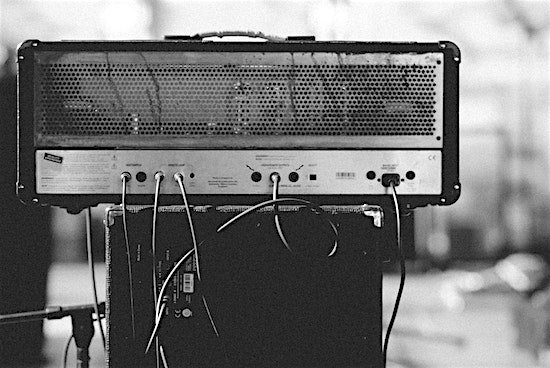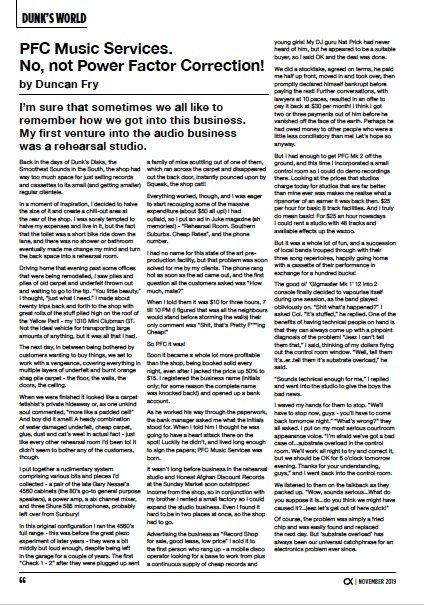News
30 Nov 2019
PFC Music Services – Not Power Factor Correction!

Subscribe to CX E-News
DUNK’S WORLD
PFC Music Services. No, not Power Factor Correction!
by Duncan Fry.
I’m sure that sometimes we all like to remember how we got into this business. My first venture into the audio business was a rehearsal studio.
Back in the days of Dunk’s Disks, the Smoothest Sounds in the South, the shop had way too much space for just selling records and cassettes to its small (and getting smaller) regular clientele.
In a moment of inspiration, I decided to halve the size of it and create a chill-out area at the rear of the shop.
I was sorely tempted to halve my expenses and live in it, but the fact that the toilet was a short bike ride down the lane, and there was no shower or bathroom eventually made me change my mind and turn the back space into a rehearsal room.
Driving home that evening past some offices that were being remodelled, I saw piles and piles of old carpet and underfelt thrown out and waiting to go to the tip. “You little beauty,” I thought, “just what I need.”
I made about twenty trips back and forth to the shop with great rolls of the stuff piled high on the roof of the Yellow Peril – my 1310 Mini Clubman GT. Not the ideal vehicle for transporting large amounts of anything, but it was all that I had.
The next day, in between being bothered by customers wanting to buy things, we set to work with a vengeance, covering everything in multiple layers of underfelt and burnt orange shag pile carpet – the floor, the walls, the doors, the ceiling.
When we were finished it looked like a carpet fetishist’s private hideaway or, as one unkind soul commented, “more like a padded cell!” And boy did it smell! A heady combination of water damaged underfelt, cheap carpet, glue, dust and cat’s wee!
In actual fact – just like every other rehearsal room I’d been to! It didn’t seem to bother any of the customers, though.
I put together a rudimentary system comprising various bits and pieces I’d collected – a pair of the late Gary Nessel’s 4560 cabinets (the 80’s go-to general purpose speakers), a power amp, a six channel mixer, and three Shure 585 microphones, probably left over from Sunbury!
In this original configuration I ran the 4560’s full range – this was before the great piezo experiment of later years – they were a bit middly but loud enough, despite being left in the garage for a couple of years.
The first “Check 1 – 2” after they were plugged up sent a family of mice scuttling out of one of them, which ran across the carpet and disappeared out the back door, instantly pounced upon by Squeak, the shop cat!!
Everything worked, though, and I was eager to start recouping some of the massive expenditure (about $50 all up!) I had outlaid, so I put an ad in Juke magazine (ah memories!) – “Rehearsal Room. Southern Suburbs. Cheap Rates”, and the phone number.
I had no name for this state of the art pre-production facility, but that problem was soon solved for me by my clients. The phone rang hot as soon as the ad came out, and the first question all the customers asked was “How much, mate?”
When I told them it was $10 for three hours, 7 till 10 PM (I figured that was all the neighbours would stand before storming the walls) their only comment was “Shit, that’s Pretty F***ing Cheap!”
So PFC it was!
Soon it became a whole lot more profitable than the shop, being booked solid every night, even after I jacked the price up 50% to $15. I registered the business name (initials only; for some reason the complete name was knocked back!) and opened up a bank account.
As he worked his way through the paperwork, the bank manager asked me what the initials stood for. When I told him I thought he was going to have a heart attack there on the spot! Luckily he didn’t, and lived long enough to sign the papers; PFC Music Services was born.
It wasn’t long before business in the rehearsal studio and Honest Afghan Discount Records at the Sunday Market soon outstripped income from the shop, so in conjunction with my brother I rented a small factory so I could expand the studio business.
Even I found it hard to be in two places at once, so the shop had to go.
Advertising the business as “Record Shop for sale, good lease, low price” I sold it to the first person who rang up – a mobile disco operator looking for a base to work from plus a continuous supply of cheap records and young girls!
My DJ guru Nat Prick had never heard of him, but he appeared to be a suitable buyer, so I said OK and the deal was done.
We did a stocktake, agreed on terms, he paid me half up front, moved in and took over, then promptly declared himself bankrupt before paying the rest! Further conversations, with lawyers at 10 paces, resulted in an offer to pay it back at $30 per month!
I think I got two or three payments out of him before he vanished off the face of the earth. Perhaps he had owed money to other people who were a little less conciliatory than me! Let’s hope so anyway. But I had enough to get PFC Mk 2 off the ground, and this time I incorporated a small control room so I could do demo recordings there.
Looking at the prices that studios charge today for studios that are far better than mine ever was makes me realise what a ripsnorter of an earner it was back then. $25 per hour for basic 8 track facilities. And I truly do mean basic!
For $25 an hour nowadays I could rent a studio with 48 tracks and available effects up the wazoo.
But it was a whole lot of fun, and a succession of local bands trouped through with their three song repertoires, happily going home with a cassette of their performance in exchange for a hundred bucks!
The good ol’ ‘Gigmaster Mk 1’ 12 into 2 console finally decided to vapourise itself during one session, as the band played obliviously on. “Shit what’s happened?” I asked Col. “It’s stuffed,” he replied.
One of the benefits of having technical people on hand is that they can always come up with a pinpoint diagnosis of the problem!
“Jeez I can’t tell them that,” I said, thinking of my dollars flying out the control room window.
“Well, tell them it’s..er..tell them it’s substrate overload,” he said. “Sounds technical enough for me,” I replied and went into the studio to give the boys the bad news.
I waved my hands for them to stop. “We’ll have to stop now, guys – you’ll have to come back tomorrow night.”
“What’s wrong?” they all asked. I put on my most serious courtroom appearance voice.
“I’m afraid we’ve got a bad case of… substrate overload in the control room. We’ll work all night to try and correct it, but we should be OK for 6 o’clock tomorrow evening. Thanks for your understanding, guys,” and I went back into the control room.
We listened to them on the talkback as they packed up.
“Wow, sounds serious…What do you suppose it is…do you think we might have caused it?… jeez let’s get out of here quick!”
Of course, the problem was simply a fried chip and was easily found and replaced the next day. But ‘substrate overload’ has always been our universal catchphrase for an electronics problem ever since.
CX Magazine – Nov 2019 Entertainment technology news and issues for Australia and New Zealand – in print and free online www.cxnetwork.com.au
© CX Media
Lead image: Kai Oberhäuser @memoryonsounds / www.ko-foto.de/ueber
Subscribe
Published monthly since 1991, our famous AV industry magazine is free for download or pay for print. Subscribers also receive CX News, our free weekly email with the latest industry news and jobs.





